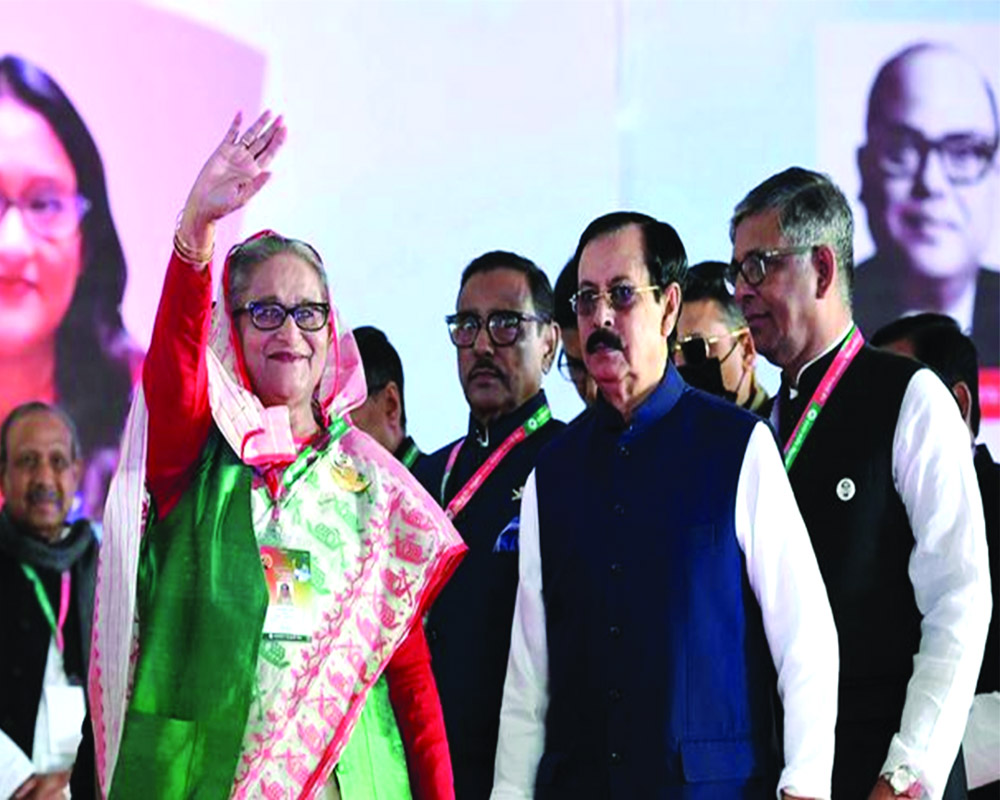Bangladesh will again become a centre of anti-India activities, should a BNP-Jama’at-led coalition return to power in Dhaka in coming elections
India must do everything possible, within four corners of international law and with absolute respect for Bangladesh’s sovereignty, to help Sheikh Hasina-led Bangladesh Awami League win the parliamentary elections scheduled in that country in January 2024. Begum Khaleda Zia-led Bangladesh Nationalist Party (BNP), the main opposition party, which is allied to the Bangladesh Jama’at-e-Islami (Jama’at) and other fundamentalist Islamist organisations, is pathologically anti-India. Bangladesh will again become a centre of anti-India activity and promoter of north-eastern India's secessionist insurgent groups, should a BNP-Jama’at-led coalition return to power in Dhaka.
A look at the record of the BNP-Jama’at-led coalition government when it was in power from 2001 to 2006, makes this clear. The issuance of threats to India, the active promotion of secessionist insurgent violence in north-eastern India, and attempts to create a climate of hostility toward India in Bangladesh were the three main features of Dhaka’s policy towards Delhi. An important example of the threats was one by its foreign minister, M. Morshed Khan, at a seminar in Dhaka on September 7, 2004. Referring to what he said were restrictions imposed by India on the import of goods from his country, he said, “Dhaka could end India’s three billion-dollar trade here by issuing an SRO (Statutory Rogatory Order) on all Indian goods entering Bangladesh.”
Striking an even more minatory note, he said, “Bangladesh is India-locked. Delhi should also remember that the seven north-eastern Indian states are Bangladesh-locked.” While an attempt to intimidate India was implicit in his reference to the vulnerability of India’s north-eastern states vis-à-vis Bangladesh, an attempt to sow discord between these states and the rest of India was scripted into his blasting of the “Central Bank of India” (Reserve Bank of India?) for acting unilaterally against the interests of the common people of India (by imposing non-tariff barriers) such as not allowing individual states to open letters of credit without permission from Delhi.
The policy of providing sanctuary and support to north-eastern India’s rebel groups, began when Bangladesh was East Pakistan, but halted after liberation in 1971 when Sheikh Mujibur Rahman was in power and resumed after his assassination. Begum Khaleda Zia’s government pursued it with vigour. In fact, when she was the leader of the opposition in Bangladesh’s national parliament, she had referred to rebels of the United Liberation Front of Asom (ULFA) and other insurgent groups of north-eastern India as “freedom fighters.” Not surprisingly, her government ridiculed India’s protests supported by information. Referring to the list of insurgent camps in Bangladesh provided by India’s Border Security Force (BSF), Major-General Mohammad Jahangir Alam Khan of the Bangladesh Rifles, visiting India for talks with BSF’s director-general, Ajay Raj Sharma, said in Delhi on September 28, 2004, “There is not a single camp in Bangladesh. We looked for the camps’ locations given in the BSF list. Some of the addresses were of our cantonment area and of our headquarters….some of the addresses even pertained to the Bay of Bengal.” In sharp contrast, the present government under Prime Minister Sheikh Hasina has not only shut these camps down but handed over to India some of the key insurgent leaders it could apprehend.
As a part of its attempt to create an anti-India temper in Bangladesh, Begum Khaleda Zia’s government even insinuated that India was behind the dastardly grenade attack on the Awami League’s rally in Dhaka on August 21, 2004. Sheikh Hasina survived—albeit with injuries—the attack, which was aimed at killing her and eliminating the Awami League’s top leadership. Twenty-four (including 22 on the spot) died and 300 were injured. Among those who succumbed to their injuries was Ivy Rahman, secretary of the Awami League’s women’s affairs wing and wife of Zillur Rahman, then the party’s general secretary and subsequently the country’s president.
Justice Joynul Abedin, a senior judge of the High Court Division of Bangladesh’s Supreme Court, appointed on August 22 as a single-person commission to inquire into the attack, submitted his report on October 2, 2004. He said at a press briefing before submitting his report that local and foreign terrorists and other culprits had launched the attack in a pre-planned way to destroy Bangladesh’s democracy, independence and sovereignty. A report in the Independent of Bangladesh on October 3, 2004, which cited dispatch by the Bangladesh Sangbad Sangstha, the country’s government-controlled national news agency as stating this, further said that, according to the commission, the attackers were foreign agents. Justice Abedin, who had once been a BNP functionary, did not identify the foreigners. Asked to elaborate on what he meant by saying that the grenade attack was the work of foreign agents, he said during a telephone conversation with Golam Mohiuddin of Bangladesh’s daily, Prothom Alo on October 3, that he had taken into special consideration Bangladesh’s geographical location and the politics of the sub-continent. He further said, “it becomes foreign the moment one crosses the geographical boundary of the country.” Asked whether the commission’s report mentioned the foreign country which was the closest (obviously India) he did not deny it but said, “I cannot answer this question of yours.”
This clearly implied that India could have been the country, Significantly, among those sentenced by a special tribunal on October 10, 2018, for complicity in the grenade attack, were important BNP leaders.
(The author is Consulting Editor, The Pioneer. The views expressed are personal)
























